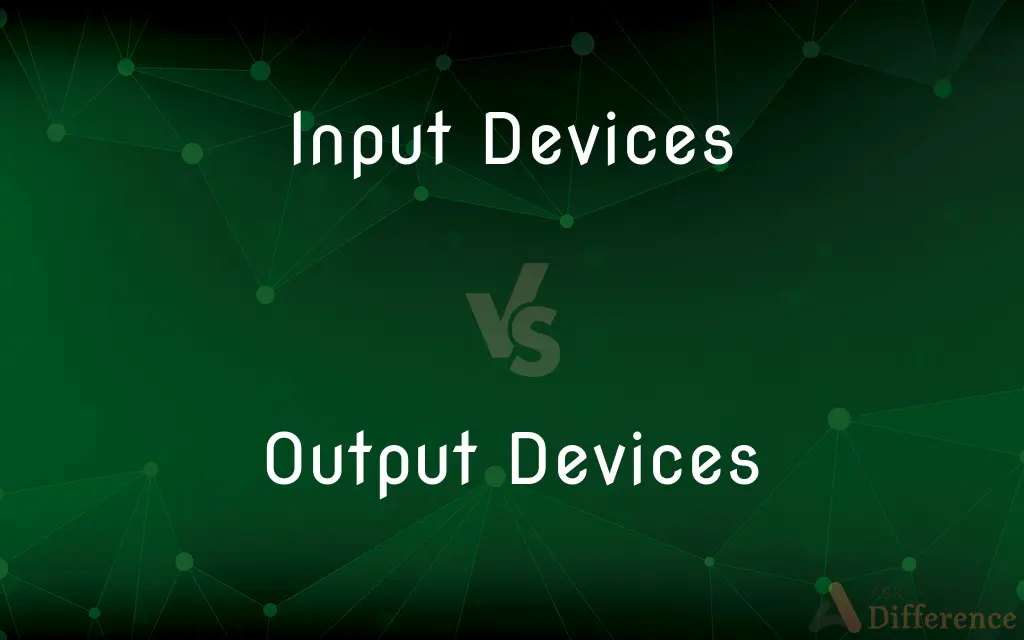Input Devices vs. Output Devices — What's the Difference?
By Tayyaba Rehman — Published on January 3, 2024
Input devices allow users to send data to a computer, while output devices display or output data from a computer.

Difference Between Input Devices and Output Devices
Table of Contents
ADVERTISEMENT
Key Differences
Input devices serve as the interface for users to communicate with computers, allowing for data entry and control. They are essential for converting user actions into signals that a computer can understand. Examples include keyboards, mice, and scanners. Output devices, on the other hand, are how computers present data to users. They take the processed data and convert it into a human-readable form, such as text on a monitor or sound through speakers.
Input devices facilitate interaction with a computer system, providing a means to input data into a computer for processing. They are the first step in the computing process, where the user's intentions are captured and relayed to the computer's central processing unit. Output devices complete the cycle by rendering the results of the computer's processed data back to the user, thus making the interaction with technology tangible, through means such as printed documents from a printer or videos on a display screen.
The design of input devices is focused on the ergonomic and efficient capture of user-initiated data. This involves a physical layout and software drivers that translate physical actions into digital signals that a computer can process. Output devices prioritize the accurate and accessible presentation of data, with technology such as high-resolution displays and high-fidelity audio systems ensuring the information is clearly and effectively communicated to the user.
Technological advancements in input devices aim to enhance user control and precision, such as touchscreens that combine the roles of input and output devices. In contrast, innovations in output devices strive to improve the clarity, detail, and immersiveness of the data presented, such as with 4K monitors or 3D printers. The development of both input and output devices continues to evolve, pushing the boundaries of how humans and computers interact.
The usability and effectiveness of a computer system often depend on the compatibility and performance of both input and output devices. Input devices must accurately capture data without causing fatigue or discomfort to the user, while output devices must present information in a way that is easy to understand and interpret. Both are integral to the computing experience but serve opposite functions: input devices bring external data into the computer, and output devices bring processed data out to the user.
ADVERTISEMENT
Comparison Chart
Function
Enable data to be entered into a computer system
Display or output data from a computer system
User Interaction
User actively uses to input data
User passively receives data from
Examples
Keyboard, mouse, microphone
Monitor, speakers, printer
Role in Processing
Initiate data processing
Conclude data processing
Type of Data
Raw data and user commands
Processed information and results
Compare with Definitions
Input Devices
Hardware used to transfer data to a computer.
She used a graphics tablet as an input device for digital painting.
Output Devices
Components that represent processed data in a perceivable form.
His new LED monitor, a key output device, showcased vibrant colors.
Input Devices
Equipment enabling the entry of data into a digital format.
She spoke into the microphone, and the speech recognition software processed her words, proving its worth as an input device.
Output Devices
Tools that translate computer-processed data into physical forms.
The printer whirred to life, an output device turning the digital report into a stack of papers.
Input Devices
Peripherals that send information to a computer's processor.
The barcode scanner, an input device, quickly added items to the inventory system.
Output Devices
Peripherals that render digital information into human-readable formats.
The digital billboard used large screens as output devices to display advertisements.
Input Devices
Tools that allow users to interact with a computer system.
He typed his password using the keyboard, an essential input device.
Output Devices
Devices that convey the results of data processing to the user.
The speakers emitted a chime, signaling an output device's alert to an incoming message.
Input Devices
Devices that translate user actions into machine-readable format.
Using a joystick as an input device makes playing flight simulator games more realistic.
Output Devices
Hardware that displays or outputs information from a computer.
The 3D printer, an innovative output device, created a detailed model from the design.
Common Curiosities
How do input devices communicate with the computer?
Input devices communicate with computers through wired or wireless connections, using data protocols to transfer information.
What is an output device?
An output device is hardware that receives and displays or projects data from a computer, such as a monitor or printer.
Can a device be both input and output?
Yes, some devices, like touch screens, can function as both input and output devices.
Are webcams considered input devices?
Yes, webcams are input devices because they capture video and images for the computer.
Can an output device change the information it receives?
No, an output device cannot change the information; it only displays or outputs data as it receives it from the computer.
Do output devices require external power to function?
Most output devices, like monitors and printers, require external power to operate.
What are some examples of output devices?
Examples of output devices include speakers, projectors, headphones, and 3D printers.
What is an input device?
An input device is hardware used to send data to a computer, such as a keyboard, mouse, or microphone.
Is a scanner an input or an output device?
A scanner is an input device as it captures images or text and sends the information to a computer.
What role do input devices play in gaming?
In gaming, input devices like controllers, keyboards, and joysticks are essential for user interaction and control.
Is a microphone an input or output device?
A microphone is an input device as it captures audio signals to send to the computer.
Why are output devices necessary for a computer system?
Output devices are necessary to translate the computer's processed data into a form understandable to humans, like visual or audio information.
What is the purpose of an input device?
The purpose of an input device is to provide a way to interact with a computer or input data into the system.
Do input devices only affect software?
Input devices primarily interact with software, but they can also affect a computer’s operations by providing commands directly to the hardware.
How do output devices impact user experience?
Output devices greatly impact user experience by providing the means for users to see, hear, and receive feedback from their computer interactions.
Share Your Discovery

Previous Comparison
Golden Rice vs. Normal Rice
Next Comparison
Abstract Class in Java vs. Interface in JavaAuthor Spotlight
Written by
Tayyaba RehmanTayyaba Rehman is a distinguished writer, currently serving as a primary contributor to askdifference.com. As a researcher in semantics and etymology, Tayyaba's passion for the complexity of languages and their distinctions has found a perfect home on the platform. Tayyaba delves into the intricacies of language, distinguishing between commonly confused words and phrases, thereby providing clarity for readers worldwide.











































